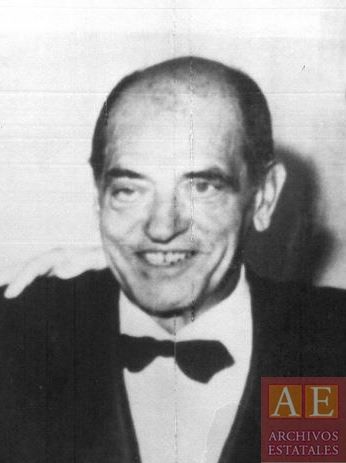 Persona - Buñuel, Luis (1900-1983)
Persona - Buñuel, Luis (1900-1983)
Identificación
Tipo:
Persona
Forma autorizada:
Buñuel, Luis (1900-1983)Otras formas
Fechas de existencia:
1900-02-22 - 1983-07-29
Historia:
Luis Buñuel fue un guionista y director de cine español, padre del surrealismo cinematográfico.
Nació en Calanda en 1900, pero en su juventud se trasladó a Madrid en 1917, para realizar sus estudios y se instaló en la Residencia de Estudiantes, lugar donde se introdujo en el mundo intelectual y donde conoció y se hizo amigo de Salvador Dalí, Federico García Lorca, Juan Ramón Jiménez y Rafael Alberti, entre otros personajes destacados. Ahí comenzó a interesarse por, el Dadaísmo y la obra de Louis Aragon y André Bretón. Éstos, provocaron, que al terminar sus estudios, se marchara a París, para poder asistir a las tertulias de intelectuales y del movimiento surrealista. Fue, al ver una obra de Fritz Lang, "Las Tres Luces" (1921), la que animó a Buñuel, a dedicarse al mundo del cine. También en París, conoció a su mujer, Jeanne Rucar, con la que se casó y tuvo dos hijos: Juan Luis y Rafael. Comenzó a trabajar en el cine como asistente de director, de Jean Epstein y realiza su primer cortometraje, junto a Salvador Dalí: Un perro andaluz (1929). A partir de ese momento, fue admitido en el grupo de los surrealistas, entre los que se encontraban Max Ernst, André Bretón, Tristán Tzara, Magritte y Louis Aragón.
En 1930, Buñuel viajó a Hollywood, contratado por la Metro Goldwyn Mayer, para conocer y aprender el sistema de producción, con el que allí se trabajaba. Fue en ese tiempo, en el que conoció a los conocidos Charles Chaplin y Serguéi Eisenstein. En 1931, a punto de proclamarse la Segunda República, regresó a España y continuó realizando películas y viajando a París. Además fue contratado por la Paramount como responsable de sincronización en España. Con el inicio de la Guerra Civil, se vió obligado a salir del país y refugiarse en Ginebra y París, pero en 1938, vuelve a Hollywood y desarrolla su carrera alternando estancias entre México y París. En 1970, viajó a España y rodó Tristana (1970), hasta los 80 siguió realizando visitas. Murió en México en 1983.
Debido a la originalidad de sus películas surrealistas y a las críticas, recibió numerosos premios y nominaciones. Ganó el Oscar a la mejor película de habla extranjera con El discreto encanto de la burguesía (1972), también nominada al Oscar al mejor guión original y con, Ese oscuro objeto del deseo (1977), estuvo nominado al Oscar de mejor guión adaptado. Falleció en Ciudad de México en 1983.
Fecha del evento: 1936 - 1939
Lugares
Fuentes
Relaciones
Relaciones asociativas :
Enlaces Externos
Recurso electrónico:
Catálogo de Autoridades:
Biografía virtual:
Catálogo de Autoridades:
Fichero de Autoridades:
Fichero de Autoridades:
Documentos
Productor de:
- No hay Unidades de Descripción asociadas.






